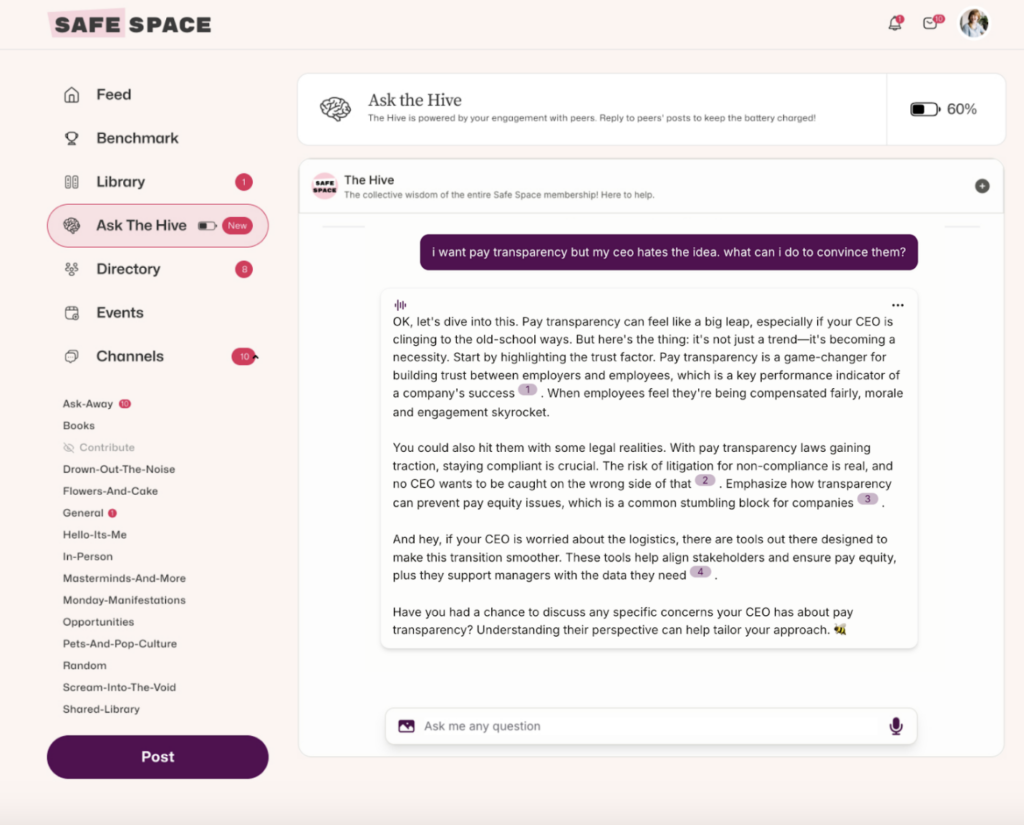
✍🏾Any recommendations on how to address questions when you’re trying to use reduced bias practices and it’s resulting in a more diverse applicant pool and you get push back on it from candidates?
Context: Wondering how to respond to candidates who ask if identity is a factor in hiring choices and push back on inclusive practices. Positions are coveted and it’s a small team.
📣Dani Herrera, Talent and DEI Consultant @ DEI by Dani:
I don’t have enough context to share an informed and accurate assessment, but *usually* when candidates ask, it is because Hiring Teams aren’t clear on what the process and success look like for that role/company.
My recommendation is to always be upfront and transparent about the process: explain the steps, share context on why you’re asking identifying questions, address who will have access to that data and for what reasons, share context on why you’re choosing to design your process like that, etc.
📣Shatoyia Nelson, Senior Director of People and Culture @ The Mob Museum
I second Dani’s opinion here. It’s essential to lead with transparency.
It sounds like they are asking why you are asking for demographic information. It’s also important to know your organization’s stance here so that whatever you share is supported should you continue to see pushback.
As People and Culture/HR Folks, our worlds around DEI will become more complex under this current administration.
📣AnnE Diemer, HR Consultant @ aedHR:
I don’t know all of the context here, so this may or may not be helpful (especially, as Shatoyia alluded to, with the changes coming with the new administration).
I usually answer questions like this by saying something like, “In our hiring processes, we evaluate a variety of factors to determine the candidate who is the best fit for the role. We consider previous experience, current skillsets, motivations, and life experiences. Our intention is to build a team that has many perspectives represented so we can best serve our diverse customer base.”
But also, FULLY agree with Dani re: candidates asking because they aren’t fully understanding the process.
Safe Space members can join this discussion here. Not a member yet? Apply to join here.

✍🏾I’ve recently stepped into a new role as the only HR representative in a company that’s never had an HR department and it feels like diving into the deep end with no floaties. While I’m excited about the opportunity, the reality of building everything from scratch while keeping the ship sailing day-to-day is hitting hard. How do I keep my head above water?
Context: Company size: ~100 employees. Industry: Mental Health (ironic)! Funding: Have been unsuccessfully raising funds for ~1 year. Fully remote.
JOIN 150K+ HR LEADERS
Get insights, learnings, and advice on how to build companies and cultures that people actually love.
No spam. Unsubscribe any time.
📣Erik Bates, Compensation Analyst @ St. Luke’s Hospital:
I’m not saying your company is the Titanic, but right now, you’re Rose on that door, and all these things being piled on you are Jack. Even when everyone in the audience is dead-set convinced that Jack could fit on that door with you, sometimes you have to let go if you’re going to survive. I’m not saying let go of the job. But you may have to take a hard look and have an honest conversation with your leaders about what tasks you can deprioritize or delegate to someone else.
I think Gary Keller was onto something when he wrote ONE Thing:
What’s the ONE thing that you can do today, that will make everything else easier or unnecessary.
Being a team of one can make everything seem like a priority, but if you’re going to survive this without burning yourself out, you’re going to need someone to support you in the company, a support network to lean on when you’re hitting a wall (hi! it’s us!), and a strategy that you can stick to when times get tough.
And, not to put a downer on it, but be ready to say, “I can’t do this alone” and walk away if they can’t give you the support you truly need. I know startup culture idolizes the grind, but there’s a limit to what anyone should be expected to do. Know your limit.
📣Miranda Bucalo, HR Director @ AE Business Solutions:
I’ve been an HR department of one for much of my career and have relied heavily on my community. Places like Safe Space are amazing…
Tapping into local organizations (MRA, UW E-Business Consortium for Madison area) that provide trainings and roundtables actually helped me find a really great network of HR peeps that share everything and support each other.
I would start with an HR audit. You can find templates or checklists out there of all the basic things an HR department should have. Also wine and tacos help 🙂
📣Katie Gerson, HR Manager @ DeNOVO Solutions:
Slow and steady.
When I jumped from leading teams of HR into being the sole HR, I learned quickly (and also very slowly) that I cannot do it all otherwise nothing is done super well. When I got to the point of feeling like I was completely drowning, I pulled in both the CEO and Ops Dir in and we had a tough conversation. Understanding that I wasn’t going to be approved a team right but telling them “Hey you have said all 60+ of these things are priority but you also need me to do the day to day and I am also getting competing priorities from both of you, this isn’t working, and I don’t feel like I am actually helpful to you.” I had done my own prioritization but needed them to prioritize what they expected so we could agree on what & where the focus was to be and when they expected certain things done so that I could be successful and help the company be successful.
There were growing pains there, and as with most positions, slip backs, but it was the push we needed. When it was out on the table, they connected the difference in my presence at work (I was in a really unhealthy mental state) and they recognized the need to adjust. I also had to realize they never had the level of HR and the work being done in areas like I was doing, so they were putting a lot on because they wanted to better the company. It was a needed balance.
All this to say, you have to feel supported by your leadership. If you don’t, that may mean stepping back from the pressure to help yourself.
Safe Space members can join this discussion here. Not a member yet? Apply to join here.


